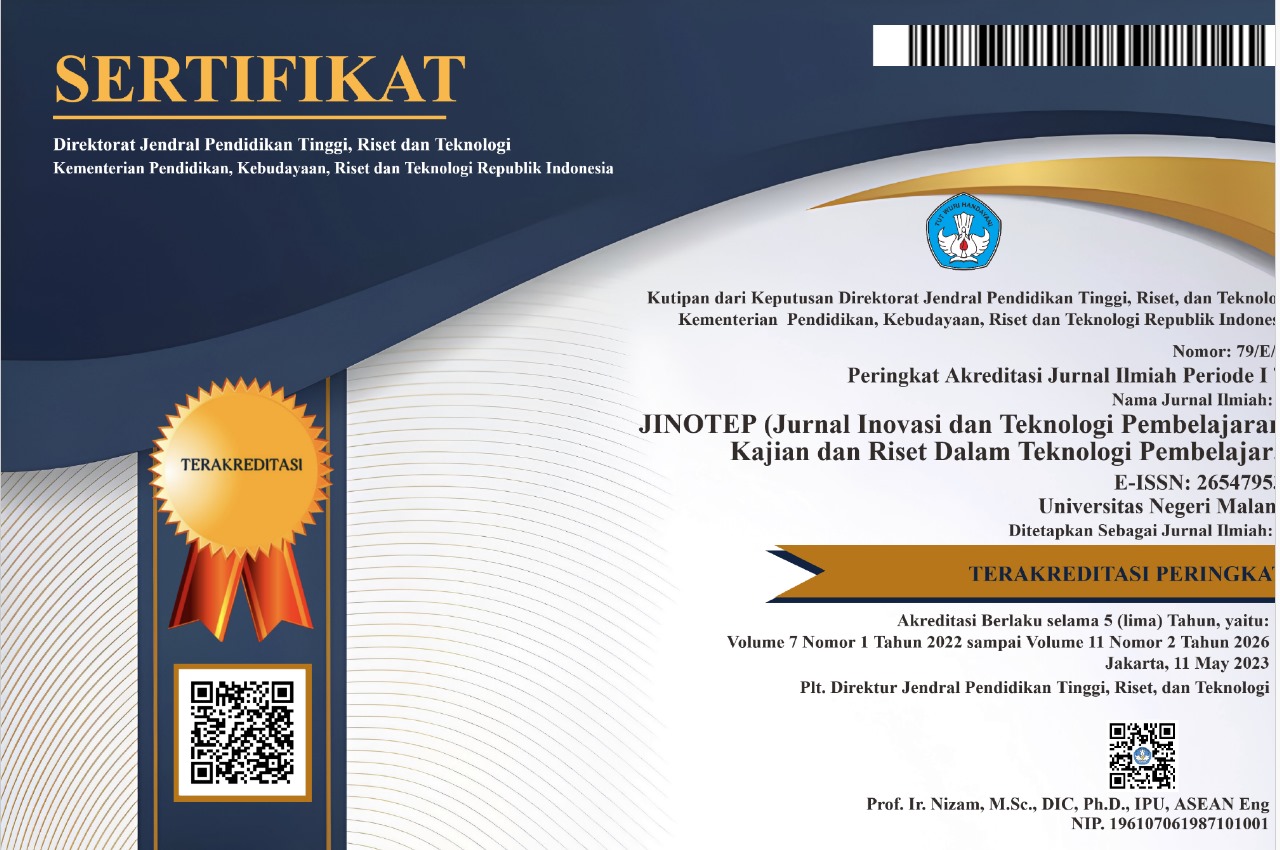Benefits of online learning according to recent studies
Abstract
Abstrak: Pembelajaran online merupakan sebuah inovasi dalam mode pembelajaran yang dibawa oleh keniscayaan teknologi informasi dan komunikasi. Studi ini menekankan pada manfaat pembelajaran online untuk otonomi siswa, motivasi, dan kemampuan kolaborasi sambil memberikan pembelajaran yang fleksibel bagi para pelajar. Penelitian ini dilakukan sebagai penelitian kepustakaan, di mana penelitian sebelumnya tentang manfaat pembelajaran online digunakan sebagai sumber data. Terungkap bahwa pembelajaran online dikatakan secara positif mempengaruhi otonomi, motivasi, dan keterampilan kolaboratif siswa, serta memungkinkan siswa belajar secara fleksibel sesuai dengan ketersediaan tempat dan waktu mereka. Ketersediaan sumber-sumber online, sarana, dan koneksi internet memungkinkan siswa mengatur pembelajarannya sendiri. Implikasi penelitian ini bagi guru, pendidik, dan siswa adalah bahwa semua harus merangkul pembelajaran daring dan berbagai aplikasinya untuk meningkatkan proses dan hasil belajar. Dengan demikian, penelitian ini berkontribusi menambah rujukan mengenai pembelajaran daring terutama kebermanfaatannya bagi siswa.
Abstract: Online learning is an innovation in learning mode brought by the inevitability of information and communication technology. The present study highlights the benefits of online learning for students. The study was conducted as library research, where previous studies on the benefits of online learning were used as the data source. The study revealed that online learning is argued to have positively affected students' autonomy, motivation, and collaboration skills while providing flexible learning for the learners. The abundance of online sources, tools, and networking enables learners to navigate their learning. These results imply that teachers, educators, and students should embrace online learning and its supporting applications to improve learning processes and outcomes. The present study contributes to the limited literature on a general overview of online learning benefits seen from the learners' side.
Keywords
Full Text:
PDFReferences
Abuhassna, H., Busalim, A. H., Mamman, B., Yahaya, N., Zakaria, M. A. Z. M., Al-Maatouk, Q., & Awae, F. (2022). From student’s experience: Does e-learning course structure influenced by learner’s prior experience, background knowledge, autonomy, and dialogue. Contemporary Educational Technology, 14(1), 1–23. https://doi.org/10.30935/cedtech/11386
Al Ghazali, F. (2020). Challenges and opportunities of fostering learner autonomy and self-access learning during the COVID-19 pandemic. Studies in Self-Access Learning Journal, 11(3), 114–127.
Alghasab, M. B. (2020). Flipping the writing classroom: focusing on the pedagogical benefits and EFL learners’ perceptions. English Language Teaching, 13(4), 28–40. https://doi.org/10.5539/elt.v13n4p28
Alghasab, M. B., Alfadley, A., & Aladwani, A. M. (2020). Factors affecting technology integration in efl classrooms: The case of kuwaiti government primary schools. Journal of Education and Learning, 9(4), 10–27. https://doi.org/10.5539/jel.v9n4p10
Alsayed, R. A., & Althaqafi, A. S. A. (2022). Online learning during the COVID-19 pandemic: benefits and challenges for EFL students. International Education Studies, 15(3), 122–129. https://doi.org/10.5539/ies.v15n3p122
Alshenqeeti, H. (2018). Motivation and foreign language learning: exploring the rise of motivation strategies in the EFL classroom. International Journal of Applied Linguistics and English Literature, 7(7), 1–8. https://doi.org/10.7575/aiac.ijalel.v.7n.7p.1
Alwasidi, A., & Alnaeem, L. (2022). EFL university teachers’ beliefs about learner autonomy and the effect of online learning experience. English Language Teaching, 15(6), 135–153. https://doi.org/10.5539/elt.v15n6p135
Ammade, S., Mahmud, M., Jabu, B., & Tahmir, S. (2018). Integrating technology in english language teaching: Global experiences and lessons for indonesia. International Journal of English Linguistics, 8(6), 107–114. https://doi.org/10.5539/ijel.v8n6p107
Ariantini, K. P., Suwastini, N. K. A., Adnyani, N. L. P. S., Dantes, G. R., & Jayantini, I. G. A. S. R. (2021). Integrating social media into English language learning: How and to what benefits according to recent studies. NOBEL: Journal of Literature and Language Teaching, 12(1), 91–111. https://doi.org/ 10.15642/NOBEL.2021.12.1.91-111
Arthana, I. K. R., Dantes, G. R., & Dantes, N. (2018). Optimalisasi pemanfaatan teknologi informasi dan komunikasi (tik) dalam bidang pendidikan melalui penerapan smart school. Jurnal Widya Laksana, 7(1), 81–91. https://doi.org/10.23887/jwl.v7i1.11885
Artini, N. N., Santosa, M. H., & Suwastini, N. K. A. (2020). Investigation of current digital divide between university lecturers and students in the ENglish as a Foreign Language context in North Bali. International Journal of Education, 13(2), 113–121. https://doi/org/10.17509/ije.v13i2.23828
Backfisch, I., Lachner, A., Stürmer, K., & Scheiter, K. (2021). Variability of teachers’ technology integration in the classroom: A matter of utility! Computers and Education, 166(February), 1–21. https://doi.org/10.1016/j.compedu.2021.104159
Bhatnagar, R., & Many, J. (2022). Teachers using social emotional learning: meeting student needs during COVID-19. International Journal of Technology in Education, 5(3), 518–534. https://doi.org/10.46328/ijte.310
Cahyani, N. M. W. S., Suwastini, N. K. A., Dantes, G. R., Jayantini, I. G. A. S. R., & Susanthi, I. G. A. A. D. (2021). Blended online learning: Combining the strengths of Synchronous and Asynchronous Online learning in EFL context. Jurnal Pendidikan Teknologi dan Kejuruan, 18(2), 174–184. https://doi.org/10.23887/jptk-undiksha.v18i2.34659
Chen, Y. (2017). Perceptions of EFL college students toward collaborative learning. English Language Teaching, 11(2), 1–4. https://doi.org/10.5539/elt.v11n2p1
Citrawati, N. K., Suwastini, N. K. A., Jayanti, I. G. A. S. R., Artini, N. N., & Dantes, G. R. (2021). Telegram as social networking service (sns) for enhancing students’ english: A systematic review. JELT (Journal of English Language Teaching and Linguistics), 6(2), 239–260. https://dx.doi.org/10.21462/jeltl.v6i2.531
Coffin, P. (2020). Implementing collaborative writing in EFL classrooms: Teachers and students’ perspectives. LEARN Journal: Language Education and Acquisition Research Network, 13(1), 178–194.
Dantes, G. R., Audina, I. P., Marsakawati, N. P. E., & Suwastini, N. K. A. (2022). Investigating the Zoom application as a video conferencing platform in the online learning process based on teacher’s perception. Jurnal Nasional Pendidikan Teknik Informatika: Janapati, 11(2), 133–144. https://doi.org/10.23887/janapati.v11i2.48456
Dantes, G. R., Rinawati, N. K. A., Suwastini, N. K. A., & Artini, N. N. (2022). Vocational school students’ perceptions of Google Classroom in full online learning at the beginning of the COVID-19 pandemic. Jurnal Pendidikan Teknologi dan Kejuruan, 19(2), 86–94. https://doi.org/10.23887/jptkundiksha.v19i2.47917
Dantes, G. R., Suarni, N. K., Dharsana, I. K., Dantes, N., Jayanta, I. N. L., Suwastini, N. K. A., & Putra, G. J. A. (2019). Evaluation of e-learning as a learning agent. International Journal of Innovation and Learning, 25(4), 451–464. https://doi.org/10.1504/IJIL.2019.099989
Dantes, G. R., Suryandani, P. D., Suwastini, N. K. A., Adnyani, N. L. P. S., & Suarcaya, P. (2022). Factors influencing students’ self-efficacy as the key to successful distance learning: According to previous studies. Jurnal Penelitian dan Pengembangan Sains dan Humaniora, 6(2), 153–160. https://doi.org/10.23887/jppsh.v6i2.50139
Desta, M. A. (2020). An investigation into the association between learning autonomy, language anxiety and thinking style: University students in focus. Journal of Language Teaching and Research, 11(2), 309--317. https://doi.org/10.17507/jltr.1102.21
Diamandis, P. H., & Kotler, S. (2012). Abundance: The future is better than you think. In Free Press (2012th ed.). Free Press. https://doi.org/10.5860/choice.49-6847
Dincer, A. (2020). Understanding the characteristics of english language learners’ out-of-class language learning through digital practices. IAFOR Journal of Education: Technology in Education, 8(2), 47–65.
Dwiyanti, K. E., & Suwastini, N. K. A. (2021). Assessment for writing skills in online learning. Lingua Scientia, 28(1), 8–19. https://doi.org/10.23887/ls.v28i1.29069
Ersani, N. P. D., Suwastini, N. K. A., Padmadewi, N. N., & Artini, L. P. (2021). Schemes of scaffolding in online education. Retorika: Jurnal Ilmu Bahasa, 7(1), 10–18. https://doi.org/10.22225/jr.7.1.2941.10-18
Eva, K., Adnyani, K., Adnyana, W., Murniasih, N. N., Komang, N., & Suwastini, A. (2022). Implementing Kahoot! for Japanese language learning in indonesian high school. Journal of Education Technology, 6(2), 217–225. https://dx.doi.org/10.23887/jet.v
Gamlo, N. (2019). The impact of mobile game-based language learning apps on efl learners’ motivation. English Language Teaching, 12(4), 49–56. https://doi.org/10.5539/elt.v12n4p49
George, M. W. (2008). Library Research. Princeton University Press.
Ginting, D., Djiwandono, P. I., Woods, R., & Lee, D. (2021). Is autonomous learning possible for asian students? the story of a MOOC from Indonesia. Teaching English with Technology, 20(1), 60–79.
Hamad, W. (2022). Understanding the foremost challenges in the transition to online teaching and learning during COVID’19 Pandemic: A systematic literature review. Journal of Educational Technology and Online Learning, 5(2), 393–410. https://doi.org/10.31681/jetol.1055695
Haryanto, E. (2021). Emergency education policy: EFL undergraduate students’ views on online learning during the COVID-19 pandemic. Indonesian Research Journal in Education| IRJE|, 5(1), 142-158. https://doi.org/10.22437/irje.v5i1.12602
Hazaea, A. N., & Alzubi, A. A. (2018). Impact of mobile-assisted language learning on learner autonomy in EFL reading context. Journal of Language and Education, 4(2), 48–58. https://doi.org/10.17323/24117390-2018-4-2-48-58
Hazaymeh, W. A. (2021). EFL students’ perceptions of online distance learning for enhancing English language learning during Covid-19 Pandemic. International Journal of Instruction, 14(3), 501–518. https://doi.org/10.29333/iji.2021.14329a
Jianfeng, C., Raj, G. S., & Ai, J. T. T. (2018). The correlations among learning motivation, autonomy and language proficiency in chinese EFL context. LEARN Journal: Language Education and Acquisition Research Network Journal, 11(1), 1–14.
Khulaifiyah, Widiati, U., Anugerahwati, M., & Suryati, N. (2021). Autonomous learning activities: the perceptions of english language students in Indonesia. Pegem Egitim ve Ogretim Dergisi, 11(3), 34–49. https://doi.org/10.14527/pegegog.2021.00
Lee, L. (2016). Autonomous learning through task-based instruction in fully online language courses. Language Learning and Technology, 20(2), 81–97.
Lee, L. (2017). Learners’ perceptions of the effectiveness of blogging for L2 writing in fully online language courses. International Journal of Computer-Assisted Language Learning and Teaching, 7(1), 19–33. https://doi.org/10.4018/IJCALLT.2017010102
Lengkanawati, N. S. (2017). Learners’ perception and practices on autonomous language learning in efl settings. Indonesian Journal of Applied Linguistics, 6(2), 222–231. https://doi.org/10.17509/ijal.v6i2.4847
Lien, T. T. N. (2022). E-Learning and learner autonomy in an EFL class in Vietnam. Language Teaching Research Quarterly, 27, 19–33. https://doi.org/10.32038/ltrq.2022.27.02
Masrizal, Apriani Fata, I., & Erdiana, N. (2020). Investigating in-service teachers’ perceptions on online and autonomous learning. Humanities & Social Sciences Reviews, 8(3), 456–465. https://doi.org/10.18510/hssr.2020.8349
Matsubara, M., & Yoshida, H. (2018). Fostering autonomous learners of vocabulary acquisition using content-based ICT methods. Humanities and Social Sciences Reviews, 6(1), 36–43. https://doi.org/10.18510/hssr.2018.617
Meisani, D. R., & Rambet, R. D. B. (2017). Teachers’ beliefs regarding language learner autonomy and practices of project-based education: A case study of an indonesian efl teacher. NOBEL: Journal of Literature and Language Teaching, 8(2), 141–149. https://doi.org/10.15642/nobel.2017.8.2.141-149
Mirawati, I. G. A., Suwastini, N. K. A., Haryanti, N. D., & Jayantini, I. G. A. S. R. (2022). Differentiated instruction: Relevant studies on its implementation. Prasi: Jurnal Bahasa, Seni, Dan Pengajarannya, 17(01), 11–21. https://doi.org/10.23887/prasi.v17i1.41867
Mukhtar, K., Javed, K., Arooj, M., & Sethi, A. (2020). Advantages, limitations and recommendations for online learning during covid-19 pandemic era. Pakistan Journal of Medical Sciences, 36(COVID19-S4), S27–S31. https://doi.org/10.12669/pjms.36.COVID19-S4.2785
Nation, I. S. P., & Macalister, J. (2009). Language Curriculum Design. In Routledge. Routledge.
Phuong, Y. H., & Vo, P. Q. (2019). Students’ learning autonomy, involvement and motivation towards their english proficiency. EduLite: Journal of English Education, Literature and Culture, 4(1), 1–12. https://doi.org/10.30659/e.4.1.1-12
Prasetyo, M. M., & Nurhidayah, N. (2021). The effect of internet use on improving student learning outcomes. Journal of Education Technology, 5(4), 511–519. https://doi.org/10.23887/jet.v5i4.40748
Purwanti, N. K. R., Suwastini, N. K. A., Adnyani, N. L. P. S., & Kultsum, U. (2022). Youtube videos for improving speaking skills : the benefits and challenges according to recent research in EFL context. Jurnal Pendidikan Teknologi Dan Kejuruan, 19(1), 66–75.
Puspawati, N. W. N., Suwastini, N. K. A., Hutapea, J. V., Dantes, G. R., & Adnyani, N. L. P. S. (2021). Consumption and production of short film: Toward the conceptualization of multimodal language learning for developing 6Cs skills in the digital age. Journal of Physics: Conference Series, 1810(1), 1–6. https://doi.org/10.1088/1742-6596/1810/1/012054
Puspitasari, P. I., Suwastini, N. K. A., Blangsinga, G. W. K. A. A., Dantes, G. R., & Tuerah, I. J. C. (2021). Boomers’ perception towards the implementation of online learning amidst Covid-19 outbreak. Proceedings of the 2nd International Conference on Technology and Educational Science (ICTES 2020), 540(Ictes 2020), 128–134.
Putra, M. A. (2021). Encouraging autonomous English learning in overcrowded online class of elementary school during pandemic. Journal of English Language Teaching and Linguistics, 6(1), 57-72.
Putri, N. R., & Sari, F. M. (2021). Investigating english teaching strategies to reduce online teaching obstacles in the secondary school. Journal of English Language Teaching and Learning, 2(1), 23–31.
Rahmayanti, P., Suwastini, N. K. A., Dantes, G. R., & Kultsum, U. (2021). Indonesian college students’ perception toward language online learning before and during COVID-19 Pandemic. Journal of Education Technology, 6(1), 56–66. https://doi.org/10.23887/jet.v6i1.41561
Richards, J. C. (2001). Curriculum Development in Language Teaching. Cambridge University Press.
Saeheng, P. (2017). A Study of e-learning, blended learning, and traditional teaching methods to motivate autonomous learning in english reading comprehension of Thais learners. IJELTAL (Indonesian Journal of English Language Teaching and Applied Linguistics), 2(1), 1–20. https://doi.org/10.21093/ijeltal.v2i1.36
Saputra, W. N. E., Wahyudi, A., Supriyanto, A., Muyana, S., Rohmadheny, P. S., Ariyanto, R. D., & Kurniawan, S. J. (2021). Student perceptions of online learning during the covid-19 pandemic in indonesia: a study of phenomenology. European Journal of Educational Research, 10(3), 1515-1528
Shi, W., & Han, L. (2019). Promoting learner autonomy through cooperative learning. English Language Teaching, 12(8), 30–36. https://doi.org/10.5539/elt.v12n8p30
Suharsih, S., & Wijayanti, M. A. (2021). Online learning for EFL learners: Perceptions, challenges, and expectations. Journal of English Language Studies, 6(2), 244–257. https://doi.org/10.30870/jels.v6i2.12122
Suwastini, N. K. A., Nalantha, I. M. D., & Dantes, G. R. (2021). The effectiveness of Google Classroom media in teaching English for Tourism at a Tourism and Business Institute. IJEE (Indonesian Journal of English Education), 8(2), 259–280. https://doi.org/10.15408/ijee.v8i2.21932
Suwastini, N. K. A., Puspawati, N. W. N., Adnyani, N. L. P. S., Dantes, G. R., & Rusnalasari, Z. D. (2021). Problem-based learning and 21st-century skills: Are they compatible? EduLite: Journal of English Education, Literature and Culture, 6(2), 326–340. http://dx.doi.org/10.30659/e.6.2.326-340
Suwastini, N. K. A., Rinawati, N. K. A., Jayantini, I. G. A. S. R., & Dantes, G. R. (2021). Differentiated instruction across EFL classrooms: A conceptual review. TELL-US Journal, 7(1), 14–41. https://doi.org/10.22202/tus.2021.v7i1.4719
Tomlinson, C. A. (2001). How to differentiate instruction in mixed-ability classrooms. In Association for Supervision and Curriculum Development. Association for Supervision and Curriculum Development.
Tomlinson, C. A. (2014). The differentiated classroom responding to the needs of all learners (2nd editio). Association for Supervision and Curriculum Development.
Trilling, B., & Fadel, C. (2009). 21st century skills: Learning for life in our times. John Wiley & Sons, Inc.
Tsai, Y. R. (2021). Promotion of learner autonomy within the framework of a flipped EFL instructional model: perception and perspectives. Computer Assisted Language Learning, 34(7), 979–1011. https://doi.org/10.1080/09588221.2019.1650779
Utami, L. P. R. A., Suwastini, N. K. A., Dantes, G. R., Suprihatin, C. T., & Adnyani, K. E. K. (2021). Virtual reality for supporting authentic learning in 21-st century language classroom. Jurnal Pendidikan Teknik Dan Kejuruan, 18(1), 132–141. https://doi.org/10.23887/jptk-undiksha.v18i1.32376
Zhong, Q. M. (2018). The Evolution of Learner Autonomy in Online Environments: A Case Study in a New Zealand Context. Studies in Self-Access Learning Journal, 9, 71–85. https://doi.org/10.37237/090106
DOI: http://dx.doi.org/10.17977/um031v10i12023p032
Refbacks
- There are currently no refbacks.
Copyright (c) 2023 Ni Komang Arie Suwastini, Kadek Intan Rustiana Dewi, Gede Rasben Dantes

This work is licensed under a Creative Commons Attribution-ShareAlike 4.0 International License.
======================================================================
Jurnal Inovasi dan Teknologi Pembelajaran published by Universitas Negeri Malang in collaboration with the Asosiasi Program Studi Teknologi Pendidikan Indonesia (APS TPI) and Ikatan Profesi Teknologi Pendidikan Indonesia (IPTPI) with a MoU.
Publisher Address:
Educational Technology Laboratorium, Building D5, 1st Floor
Faculty of Education, Universitas Negeri Malang
Semarang St. No. 5, Malang City, East Java Province, Postal Code 65145
Email: jinotep.fip@um.ac.id
======================================================================

JINOTEP is licensed under a Creative Commons Attribution-ShareAlike 4.0 International License.
JINOTEP Statistics (Since July 13th, 2020)



.png)




.png)
1.png)
1.png)
4.png)
2.png)
1.png)
1.png)
.png)


_3.png)





1.png)
.png)